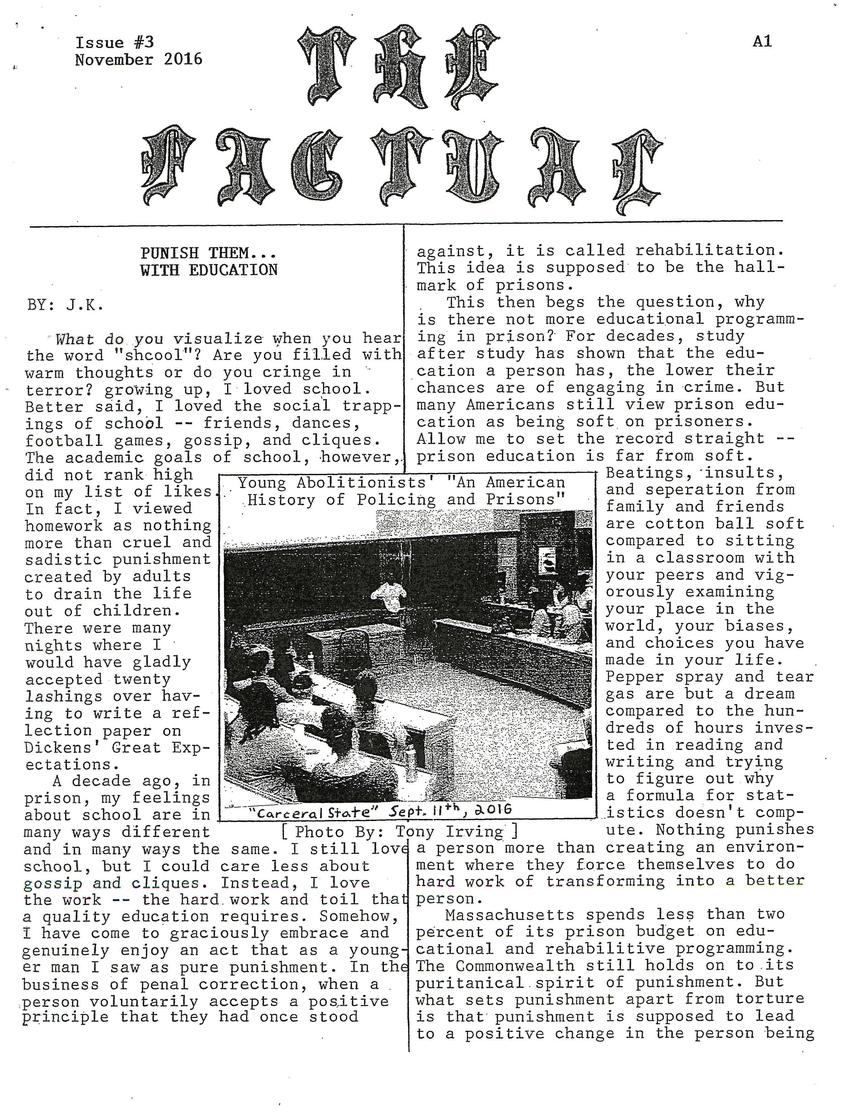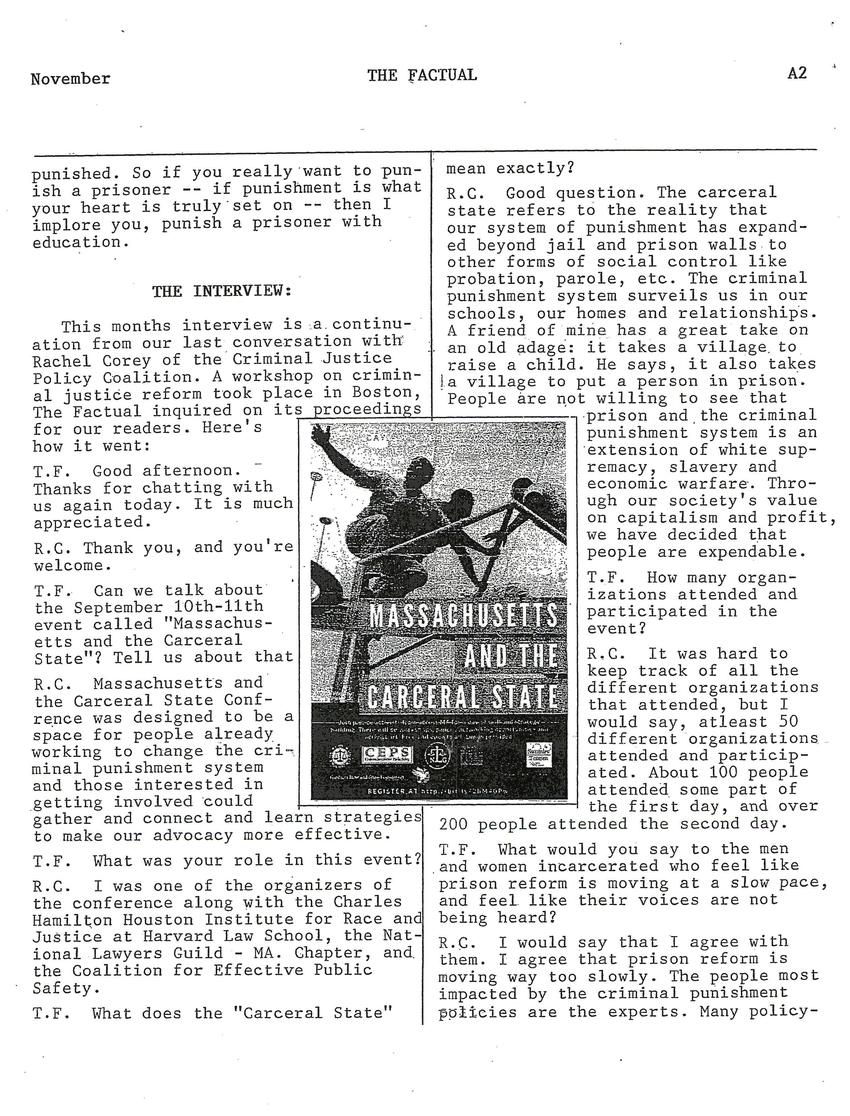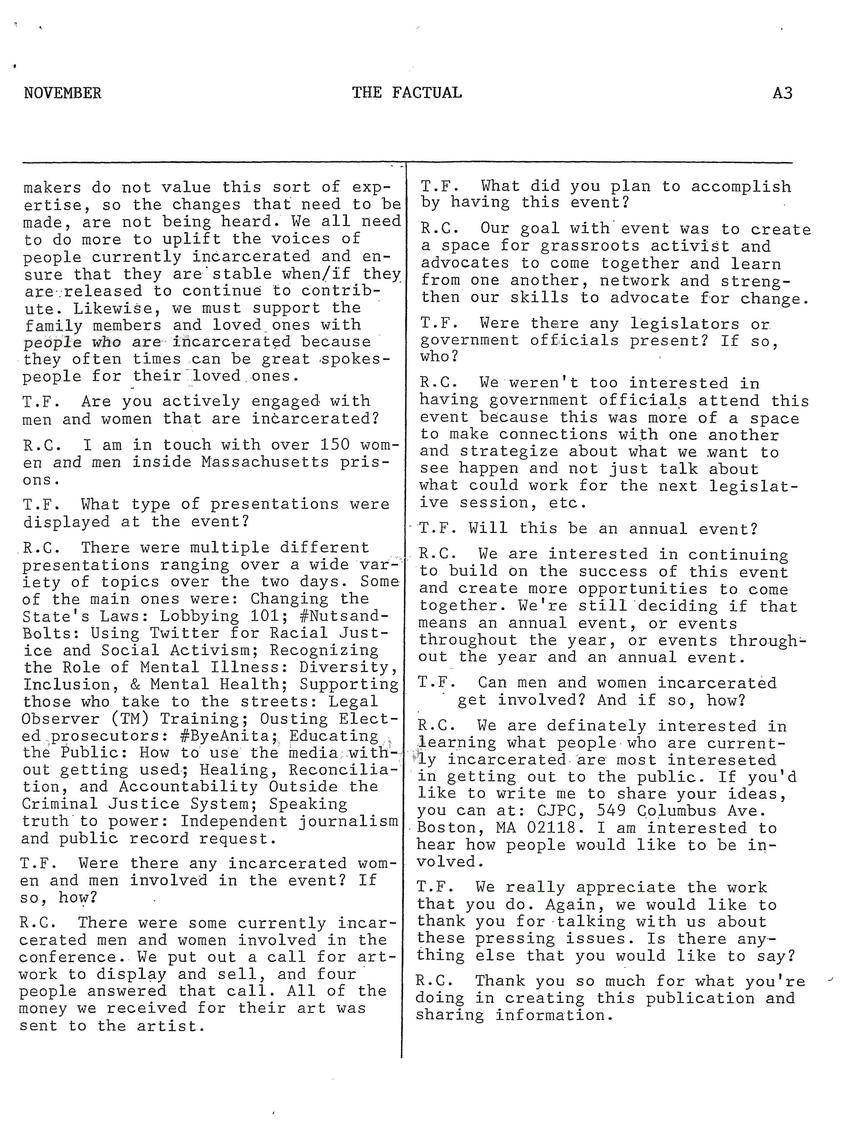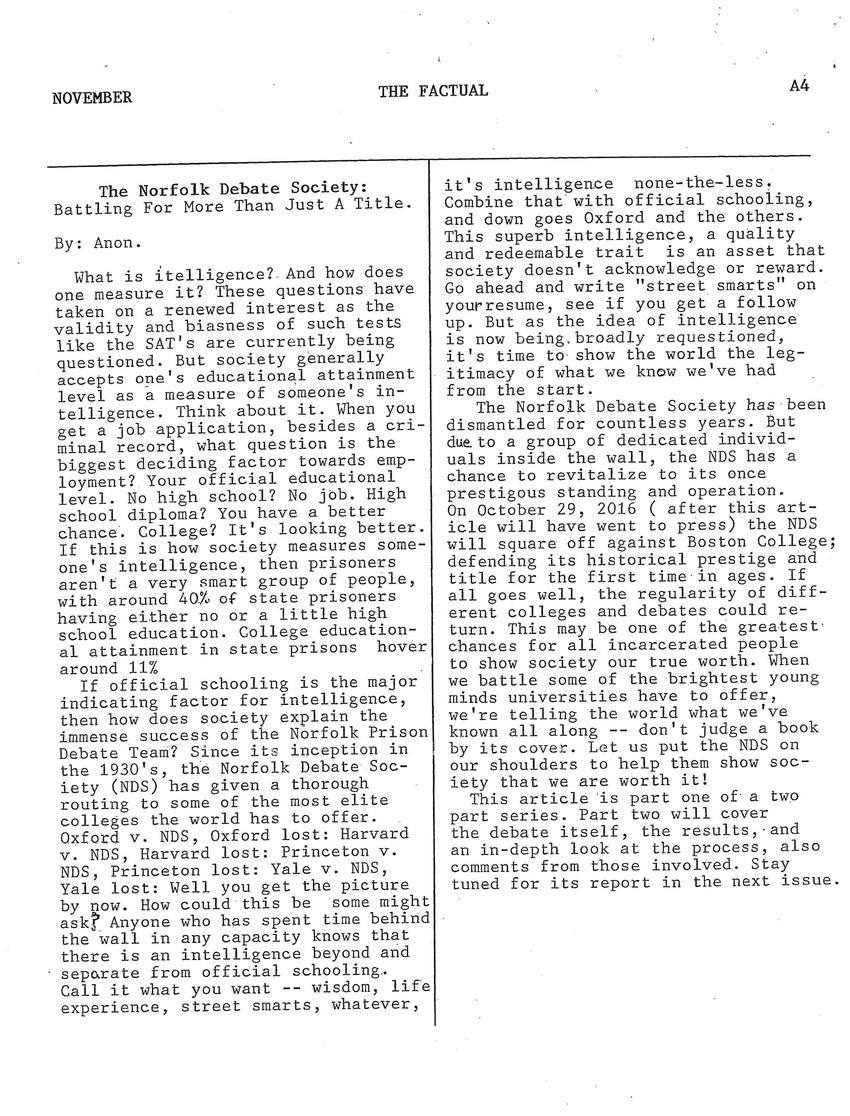
Transcription
Issue#3
November 2016
The Factual
PUNISH THEM.....
WITH EDUCATION
BY: J.K
What do you visualize when you hear the word "school"? Are you filled with warm thoughts or do you cringe in terror? Growing up, I loved school. Better said, I loved the social trappings of school--Friends, dances, football games, gossip, and cliques. The academic goals of school, however, did not rank high on my list of likes. In fact, I viewed homework as nothing more then cruel and sadistic punishment created by adults to drain the life out of children. There were many nights where I would of gladly accepted twenty lashings over having to write a reflection paper on Dickens Great Expectations.
A decade ago, in prison, my feelings about school are in many ways different and in many ways the same. I still love school, but I could care less about gossip and cliques. Instead, I love the work.-- the hard work and toil that a quality education requires. Somehow, I have come to graciously embrace and genuinely enjoy an act that as a younger man I saw as pure correction, when a person voluntarily accepts a positive principle that they had once stood against, it is called rehabilitation. This idea is supposed to be the hallmark of prisons.
This then begs the question, why is there not more educational programming in prison? For decades, study after study has shown that the education a person has, the lower their chances are of engaging in crime. But many Americans still view prison education as being soft of prisoners. Allow me to set the record straight-- Prison education is far from soft. Beatings, insults, and separation from family and friends are cotton ball soft compared to sitting in a classroom with peers and vigorously examine your place in the world, your biases, and choices you have made in your life. Pepper Spray and tear gas are but a dream compared to the hundreds of hours invested in reading and writing and trying to figure out why a formula for statistics doesn't compute. Nothing punishes a person more than creating an environment where they force themselves to do hard work of transforming into a better person.
Massachusetts spends less than two percent of its prison budget on educational and rehabilitative programming. The Commonwealth still holds on to its puritanical spirit of punishment. But what sets punishment apart from torture is that punishment is supposed to lead to a positive change in the person being punished. So if you really want to punish a prisoner if punishment is what your heart is truly set on then I implore you, punish a prisoner with education.
THE INTERVIEW:
[Article includes an image of a poster with the text "MASSACHUSETTS AND THE CARCERAL STATE" on]
This months interview is a continuation from out last conversation with Rachel Corey of the Criminal Justice Policy Coalition. A workshop on criminal Justice reform took place in Boston, The Factual inquired on its proceedings for our readers. Here's how it went:
T.F: Good Afternoon. Thanks for chatting with us again today. It is much appreciated.
R.C: Thank you, and you're welcome.
T.F: Can we talk about the September 10th-11th event called "Massachusetts and the Carceral State"? Tell us about that
R.C: Massachusetts and the Carceral State Conference was designed to be a space for people already working to change the criminal punishment system and those interested in getting involved could gather and connect and learn strategies to make our advocacy more effective.
T.F: What was your role in this event?
R.C: I was one of the organizers of the conference along with the Charles Hamilton Houston Institute for Race and Justice at Harvard Law School, the National Lawyers Guild - MA. Chapter, and the Coalition for Effective Public Safety.
T.F: What does the "Carceral State" mean exactly?
R.C: Good question. The carceral state refers to the reality that our system of punishment has expanded beyond jail and prison walls to other forms of social control like probation, parole, etc. The criminal punishment system surveils us in our schools, our homes and relationships. A friend of mine has a great take on an old adage: it takes a village to raise a child. He says, it also takes a village to put a person in prison. People are not willing to see that prison and the criminal punishment system is an extension of white supremacy, slavery and economic warfare. Though our society's value on capitalism and profit, we have decided that people are expendable.
T.F: How many organizations attended and participated in the event?
R.C: It was hard to keep track of all the different organizations that attended, but I would say, at least 50 different organizations attended and participated. About 100 people attended some part of the first day, and over 200 people attended the second day.
T.F: What would you say to the men and women incarcerated who feel like prison reform is moving at a slow pace, and feel like their voices are not being heard?
R.C: I would say that I agree with them. I agree that prison reform is moving way too slowly. The people most impacted by the criminal punishment policies are the experts. Many policy-makers do not value this sort of expertise, so the changes that need to be made, are not being heard. We all need to do more to uplift the voices of people currently incarcerated and ensure that they are stable when/it they are released to continue to contribute. Likewise, we must support the family members and loved ones with people who are incarcerated because they often time can be great spokespeople for their loved one.
T.F: Are you actively engaged with men and women that are incarcerated?
R.C: I am in touch with over 150 women and men inside Massachusetts prisons.
T.F: What type of presentations were displayed at the event?
R.C: There were multiple different presentations ranging over a wide variety of topics over the two days. Some of the main ones were: Changing the State's Laws: Lobbying 101; #NutsandBolts: Using Twitter for Racial Justice and Social Activism; Recognizing the Role of Mental Illness: Diversity, Inclusion, & Mental Health; Supporting those who take to the streets: Legal Observer (TM) Training; Ousting Elected prosecutors: #ByeAnita; Educating the Public: How to use the media without getting used; Healing, Reconciliation, and Accountability Outside the Criminal Justice System; Speaking truth to power: Independent journalism and public record request.
T.F: Were there any incarcerated women and met involved in the event? If so, how?
R.C: There were some currently incarcerated men and women involved in the conference. We put out a call for artwork to display and sell, and four people answered that call. All of the money we received for their art was sent to the artist.
T.F: What did you plan to accomplish by having this event?
R.C: Our goal with event was to create a space for grassroots activists and advocates to come together and learn from one another, network and strengthen our skills to advocate for change.
T.F: Were there any legislators or government officials present? If so, who?
R.C: We weren't too interested in having government officials attend this event because this was more of a space to make connections with one another and strategize about what we want to see happen and not just talk about what could work for the next legislative session, etc.
T.F: Will this be an annual event?
R.C: We are interested in continuing to build on the success of this event and create more opportunities to come together. We're still deciding if that means an annual event, or events throughout the year, or events throughout the year and an annual event.
T.F: Can men and women incarcerated get involved? And if so, how?
R.C: We are definitely interested in learning what people who are currently incarcerated are most interested in getting out to the public. If you'd like to write me to share your ideas, you can at: CJPC, 549 Columbus Ave. Boston, MA. 02118. I am interested to hear how people would like to be involved.
T.F: We really appreciate the work that you do. Again, we would like to thank you for talking with us about these pressing issues. Is there anything else that you would like to say?
R.C: Thank you so much for what you're doing in creating this publication and sharing information.
-----
The Norfolk Debate Society:
Battling For More Than Just A Title.
By: Anon.
What is intelligence? And how does one measure it? These questions have taken on a renewed interest as the validity and biasness of such tests like the SAT's are currently being questioned. Buy society generally accepts one's educational attainment level as a measure of someone's intelligence. Think about it. When you get a job application, besides a criminal record, what question is the biggest deciding factor towards employment? Your official educational level. No high school? No job. High school diploma? You have a better change. College? It's looking better. If this is how society measures someone's intelligence then prisoners aren't a very smart group of people, without around 40% of state prisoners having either no or a little high school education. College educational attainment in state prisons hover around 11%.
If official schooling is the major indicating factor for intelligence, then how does society explain the immense success of the Norfolk Prison Debate Team? Since its inception in the 1930's, the Norfolk Debate Society (NDS) has given a thorough routing to some of the most elite colleges the work has to offer. Oxford V. NDS, Oxford lost: Harvard v. NDS, Harvard lost: Princeton v. NDS, Princeton lost: Yale v. NDS, Yale lost: Well you get the picture by now. How could this be some might ask? Anyone who has spent time behind the wall in any capacity knows that there is an intelligence beyond and separate from official schooling. Call it what you want -- wisdom, life experience, street smarts, whatever, it's intelligence none-the-less. Combine that with official schooling, and down goes Oxford and the others. This superb intelligence, a quality and redeemable trait is an asset that society doesn't acknowledge or reward. Go ahead and write "street smarts" on your resume, see if you get a follow up. But as the idea of intelligence is now being broadly requestioned, it's time to show the world the legitimacy of what we know we've had from the start.
The Norfolk Debate Society has been dismantled for countless years. But due to a group of dedicated individuals inside the wall, the NDS has a chance to revitalize to its once prestigious standing and operation. On October 29, 2016 (after this article will have went to press) the NDS will square off against Boston College; defending its historical prestige and title for the first time in ages. If all goes well, the regularity of different colleges and debates could return. This may be one of the greatest chances for all incarcerated people to show society our true worth. When we battle some of the brightest you minds universities have to offer, we're telling the world what we're known all along -- don't judge a book by its cover. Let us put the NDS on our shoulders to help them show society that we are worth it!
This article is part one of a two part series. Part two will cover the debate itself, the results, and an in-depth look at the process, also comments from those involved. Stay tuned for its report in the next issue.
Other posts by this author
|
2017 jun 24

|
2017 jun 24

|
2017 jun 24

|
2017 jun 24

|
2017 jun 18

|
2017 jun 15

|
More... |





Replies